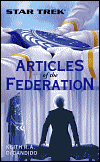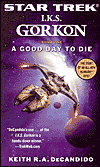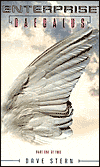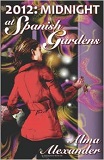TOS: Crucible: SpockThe Fire and the Rose, by David R. George
Book Review by David Roy
Have you read this book?
Last year was the 40th anniversary of "Star Trek," and Pocket Books celebrated it with, along with a few other notable books, a trilogy written by David R. George III that takes an in-depth look at the three primary characters from the original series: Kirk, Spock, and McCoy. The second book in the trilogy, The Fire and the Rose, takes a look at Spock. It doesn't cover his entire life like "Provenance of Shadows" did for McCoy, but instead examines the later portions of Spock's life. It's also not quite as good as the McCoy book, but that's not because of the difference in theme.
All three books in the series will have a starting point of the death of Edith Keeler in the episode "City on the Edge of Forever," and this book deals with Spock's reaction to his convincing James Kirk to let the love of his life die. When Kirk dies in the movie "Generations," Spock is forced to re-examine his life and the choices he has made, and realizes that he has made other, more selfish choices in various other time-related incidents. How can he reconcile forcing Kirk to make such a momentous decision while other times avoiding making it for himself? As he did once before (right before the first Trek movie), he decides he must go through Kolinahr, the process by which Vulcans eliminate emotions (rather than suppressing them, as normal Vulcans do). He cannot take the emotional anguish that Kirk's loss, combined with his realizations, has caused. But events may prove that this is the wrong decision, and Spock may have to find another way to come to terms with himself.
The Fire and the Rose is like the original Crucible book in one way; it is an examination of one man's life and his choices. It is not filled with action; in fact there is only one real action scene in the book. Instead, it is a character piece, demonstrating how the choices we make form who we are. The format of the book is much different too. It is two-tiered, much like McCoy's book, but it doesn't have a dual timeline. Instead, in the second tier, we see the events of the Edith Keeler episode from Spock's point of view, with much more detail than the episode ever had time for. We see exactly how Kirk falls in love with Keeler, the emotional dagger that letting her die causes Kirk, and a Vulcan who is still trying to understand emotion and reconcile his Vulcan and human half tries to feel for what Kirk is going through.
In the "present" day of Spock trying to come to terms with Kirk's death, we see the pain that Spock goes through as he slowly develops feeling for another ambassador, Alexandra, a human woman with whom the attraction is mutual. They begin to get closer, and George walks the fine line between Vulcan logic and emotionalism that Spock has always walked. In the movie-era, Spock has always seemed more comfortable with his hybrid nature, but Kirk's death starts to bring that into question. George effectively portrays the anguish, as well as the hurt caused to Alexandra by his decision to withdraw back to Vulcan. As ever, George's prose is beautiful, but this time it's remarkably concise. Either George has reined in his verbose tendencies or the story isn't quite as detailed as some of his earlier books.
I loved seeing a more in-depth look into the episode than we've ever seen before (though that might be the reason the Ellison launched a lawsuit about the trilogy). It was nice to see Kirk and Edith's relationship actually develop over time, and we see why Kirk was so attached to her. Given what we've had so far, it was always hard to buy that Edith was the love of Kirk's life whose death has always affected him. George illustrates that and makes us care about both of them.
To be clear, though, this is definitely Spock's book. George has said that he found it difficult writing a book examining the emotions of a man who has always suppressed them. I think he did a wonderful job with it, and the whole Kolinahr process is a good springboard to do it with. In the Kolinahr process, Spock reveals many other stories, allowing George to dabble with continuity from past episodes, including the animated series. We see other time-travel incidents where Spock has made a different choice than what he convinced Kirk was the proper one. In fact, George is able to weave the continuity of all the time-travel episodes (including Star Trek IV) into a glorious tapestry, demonstrating and revelling in their inherent contradictions (why must Kirk let Edith die, yet it's ok to bring two humpback whales and an whale specialist into the future to save Earth?).
George also does a remarkable job with characterization. Amanda and Sarek (Spock's parents) are beautifully done, with Amanda being extremely hurt by Spock's decision to pursue Kolinahr, and his attitude toward her when he successfully completes it. Sarek understands his son, but disagrees with his choices and does his best to protect his wife. McCoy is also great, and George ties this book in with McCoy's book in certain sections, though it's certainly not necessary to read the first book before reading this one. The only small quibble I have is that I can't believe that Spock ever thought Sarek went through Kolinahr. Given his marriage to a human wife, I can't see any way for Sarek to have done so and not driven Amanda away. I can't see Spock making that assumption all his life, and the revelation that Sarek never did doesn't seem to have much point in the book.
Finally, a continuity notice. The Crucible books are not tied in to any of the other novels, other than themselves. Those of you used to regular novel continuity may find yourself jarred out of the book when something different happens. For example, George quickly asserts that, unlike current novel continuity, Spock and Saavik never married because of their teacher-pupil relationship. On the other hand, George revels in the continuity of the television series and animated series, as well as the movies. Normally I don't like excessive continuity, but George incorporates it so well, in addition to setting large scenes in the middle of said episodes/movies, that I loved ever minute of it.
If you're a fan of the original Trek series, you definitely need to give the Crucible series a try. And if you're just a Spock fan, feel free to try The Fire and the Rose. I'm not as in love with it as I am McCoy's book, but it is definitely a must-read. On to Kirk's story!
All three books in the series will have a starting point of the death of Edith Keeler in the episode "City on the Edge of Forever," and this book deals with Spock's reaction to his convincing James Kirk to let the love of his life die. When Kirk dies in the movie "Generations," Spock is forced to re-examine his life and the choices he has made, and realizes that he has made other, more selfish choices in various other time-related incidents. How can he reconcile forcing Kirk to make such a momentous decision while other times avoiding making it for himself? As he did once before (right before the first Trek movie), he decides he must go through Kolinahr, the process by which Vulcans eliminate emotions (rather than suppressing them, as normal Vulcans do). He cannot take the emotional anguish that Kirk's loss, combined with his realizations, has caused. But events may prove that this is the wrong decision, and Spock may have to find another way to come to terms with himself.
The Fire and the Rose is like the original Crucible book in one way; it is an examination of one man's life and his choices. It is not filled with action; in fact there is only one real action scene in the book. Instead, it is a character piece, demonstrating how the choices we make form who we are. The format of the book is much different too. It is two-tiered, much like McCoy's book, but it doesn't have a dual timeline. Instead, in the second tier, we see the events of the Edith Keeler episode from Spock's point of view, with much more detail than the episode ever had time for. We see exactly how Kirk falls in love with Keeler, the emotional dagger that letting her die causes Kirk, and a Vulcan who is still trying to understand emotion and reconcile his Vulcan and human half tries to feel for what Kirk is going through.
In the "present" day of Spock trying to come to terms with Kirk's death, we see the pain that Spock goes through as he slowly develops feeling for another ambassador, Alexandra, a human woman with whom the attraction is mutual. They begin to get closer, and George walks the fine line between Vulcan logic and emotionalism that Spock has always walked. In the movie-era, Spock has always seemed more comfortable with his hybrid nature, but Kirk's death starts to bring that into question. George effectively portrays the anguish, as well as the hurt caused to Alexandra by his decision to withdraw back to Vulcan. As ever, George's prose is beautiful, but this time it's remarkably concise. Either George has reined in his verbose tendencies or the story isn't quite as detailed as some of his earlier books.
I loved seeing a more in-depth look into the episode than we've ever seen before (though that might be the reason the Ellison launched a lawsuit about the trilogy). It was nice to see Kirk and Edith's relationship actually develop over time, and we see why Kirk was so attached to her. Given what we've had so far, it was always hard to buy that Edith was the love of Kirk's life whose death has always affected him. George illustrates that and makes us care about both of them.
To be clear, though, this is definitely Spock's book. George has said that he found it difficult writing a book examining the emotions of a man who has always suppressed them. I think he did a wonderful job with it, and the whole Kolinahr process is a good springboard to do it with. In the Kolinahr process, Spock reveals many other stories, allowing George to dabble with continuity from past episodes, including the animated series. We see other time-travel incidents where Spock has made a different choice than what he convinced Kirk was the proper one. In fact, George is able to weave the continuity of all the time-travel episodes (including Star Trek IV) into a glorious tapestry, demonstrating and revelling in their inherent contradictions (why must Kirk let Edith die, yet it's ok to bring two humpback whales and an whale specialist into the future to save Earth?).
George also does a remarkable job with characterization. Amanda and Sarek (Spock's parents) are beautifully done, with Amanda being extremely hurt by Spock's decision to pursue Kolinahr, and his attitude toward her when he successfully completes it. Sarek understands his son, but disagrees with his choices and does his best to protect his wife. McCoy is also great, and George ties this book in with McCoy's book in certain sections, though it's certainly not necessary to read the first book before reading this one. The only small quibble I have is that I can't believe that Spock ever thought Sarek went through Kolinahr. Given his marriage to a human wife, I can't see any way for Sarek to have done so and not driven Amanda away. I can't see Spock making that assumption all his life, and the revelation that Sarek never did doesn't seem to have much point in the book.
Finally, a continuity notice. The Crucible books are not tied in to any of the other novels, other than themselves. Those of you used to regular novel continuity may find yourself jarred out of the book when something different happens. For example, George quickly asserts that, unlike current novel continuity, Spock and Saavik never married because of their teacher-pupil relationship. On the other hand, George revels in the continuity of the television series and animated series, as well as the movies. Normally I don't like excessive continuity, but George incorporates it so well, in addition to setting large scenes in the middle of said episodes/movies, that I loved ever minute of it.
If you're a fan of the original Trek series, you definitely need to give the Crucible series a try. And if you're just a Spock fan, feel free to try The Fire and the Rose. I'm not as in love with it as I am McCoy's book, but it is definitely a must-read. On to Kirk's story!
|
Click here to buy TOS: Crucible: Spock-The Fire and the Rose, by David R. George on Amazon
|
TOS: Crucible: Spock-The Fire and the Rose, by David R. George on Amazon
| More Books You Might Like |
Comment on TOS: Crucible: Spock-The Fire and the Rose, by David R. George
| Comments on TOS: Crucible: Spock-The Fire and the Rose, by David R. George |
| There are no comments on this book. |



